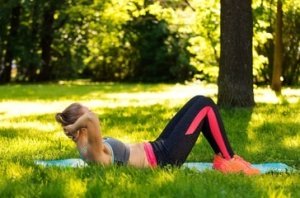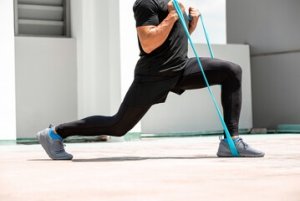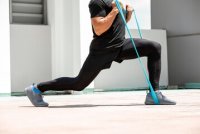Step By Step Exercises


Use these step by step exercises to strengthen and tone your body and help you lose weight.
These exercise instructions come complete with step by step moves and illustrations to ensure you are doing them correctly.The different workouts include the upper body, lower body and core muscles. In addition there are exercises for the upper and lower back.
There are specific pages for seniors or those with limited mobility. Lastly, you will find stretching exercises for the various muscle groups as well.
Use the links below to find the area you want to exercise. When exercising you want to make sure you are doing it correctly to get the most benefit from your workout so be sure to follow the step by step instructions for the workout.
Step by Step Exercises - Abdominals
This group of exercise instructions target your abdominal muscles. Do a variety of these exercises to help flatten your stomach and strengthen your core. There are three different instructional pages for the abdominal exercises. Use the links below to go to the workout you want to perform.


All the instructions are grouped into three different pages. The first, abdominal crunches, will work primarily the rectus abdominis muscle.
The next group of step by step exercises are for the oblique. As the name suggests, these will primarily target your oblique (or side) abdominal muscles.
The last group are the transverse abdominal instructions. As you have already figured out, these will work the deep abdominal muscle known as the transversus abdominis.
Each group is a series of five to six different exercises complete with step by step instructions. Use the links below to go to the specific group of exercises.
Step by Step Exercises - Back Strengthening

Back exercises are important to keep a strong core. Doing abdominal exercises alone does not fully strengthen the back.
So you need to include some strengthening and stretching exercises to keep your back strong.
Our backs are used everyday with normal activities. As you reach or bend for an item, you are using your back muscles.
If not properly conditioned, you could potential strain your back. This can cause back pain and/or injuries.
While lower back pain is the most common, you want to ensure you condition all of the back. Strengthening the lower, middle and upper back can minimize risk of pain and injuries.
The primary muscles you will be targeting with these exercises for the back include the Erector Spinae, Latissimus Dorsi and the Trapezius muscle.
Other muscles that will be strengthened and stretched with these exercises include the Infraspinatus, Teres Major and Teres Minor muscles.
There are three different groups of exercise instructions for the back exercise series. The first two are strengthening exercises; one series is for the lower back and the other series is the upper back. There is one series for back stretching exercises that will stretch both the upper and lower back.
Click on a link below to go to the back workout you want to try.
Step By Step Exercises for Seniors
Senior exercises are not that much different than other exercises. The primary difference is in the intensity, duration and how and where they are performed.


As with younger adults, exercises for seniors includes strength training, stretching routines and endurance or aerobic workouts. In addition to these types of workouts, as a senior you want to add some balancing movements as well.
In fact, these four types of workouts for seniors are recommended by the National Institute of Health (NIH).
You will find strengthening exercises for the upper and lower body, stretches, abdominal exercises and balance step by step exercises for seniors. Many of these exercises are performed from the safety of a chair.
They are great for seniors as well as those with physical limitations. Here are the exercises with instructions for seniors.
- Senior Strength Training Exercises
- Chair Exercises
- Balance Exercises
- Senior Stretching
- Ankle, Wrist and Arm Exercises
Strengthening Step by Step Exercises
Strength training is a crucial element to staying healthy and lose weight. Many people think that an aerobic workout is the only way to lose weight.
While aerobics burns calories during the workout more than strength training, the strengtheing of your muscles helps to increase your metabolism.
By toning your muscles, you are increasing muscle mass, which in turn burns more calories by increasing your metabolism.


This means by adding some form of strengthening workouts to your weekly routine, you can burn more calories and lose weight.
Increasing your BMR is just one of the many advantages to strength training for weight loss and for your health. There are lots of other benefits to this type of exercise.
Find out more about Strength Training and the many health benefits.
The strengthening exercises listed below are broken down into several areas based on equipment used and group of muscles strengthened. Simply click on the link below to go to the step by step instruction page for the exercises you want to try.
- Toning Exercises
- Lower Body Dumbbell Exercises
- Upper Body Dumbbell Workout
- Lower Body Resistance Training
- Upper Body Resistance Training
Isometric Exercises are another great way to strengthen muscles. Learn more about this static workout with this article.
Stretching Exercises


Stretching exercises is a great way to keep your muscles flexible, strong, and healthy, which is needed to maintain a range of motion in the joints. Stretching can improve your performance in physical activities and help prevent injuries.
Additionally stretching improves your posture, increases blood flow and can relieve back pain and tension.
To get the benefits of stretching exercises you want to make sure you do them correctly and do them at the right times. Here are some basics of stretching.
When stretching, you don't want to over stretch or bounce the muscles as this can cause micro-trauma or tears in the muscle.
Stretching in the morning can relieve and pain or tension from sleeping the night before. Stretching in the evening prior to bed can help relax your muscles and give you a better nights sleep.
Below you will find stretches for the lower body including legs, hips, calves and more. There are also upper body stretches that will lengthen the chest, shoulder and arm muscles. Use the links below to go to the step by step instructions for these stretching exercises.
Here are a few tips on stretching
Warm up your Muscles
You should never stretch when your muscles have not yet been properly warmed up. Before doing your stretching exercises warm up for 5 to 10 minutes by lightly jogging or marching in place moving your legs and arms.
Stretch Before Exercise or Sports
Although doing stretching exercises before a workout is widely debated, it is believed that stretching before certain activities can help minimize injury. It also gives you a wider range of motion during the activity. As a general rule, you should stretch before an aerobic exercise and active sports.
Target Stretching
When performing your stretching routine, target all the major muscles like your hips, thighs, calves, back, shoulders, arms and neck By stretching these major muscles you are properly getting them ready for your exercise routine or your every day activities. You should also target stretch specific muscles you plan on using during your workout or the activities you perform daily.
In addition to these exercises, you can add other activities to burn calories to help you lose weight and get healthy.
Additional Articles
BMR Calculator
Calculate your Basal Metabolic Rate (BMR) and determine what your calorie needs are based on your activity level.
Benefits of Exercises
The benefits of exercising go well beyond weight loss. Find out more with this article.
Exercise Tips
Don't know where to start building your exericse routine? Use these
tips to help you get started.
